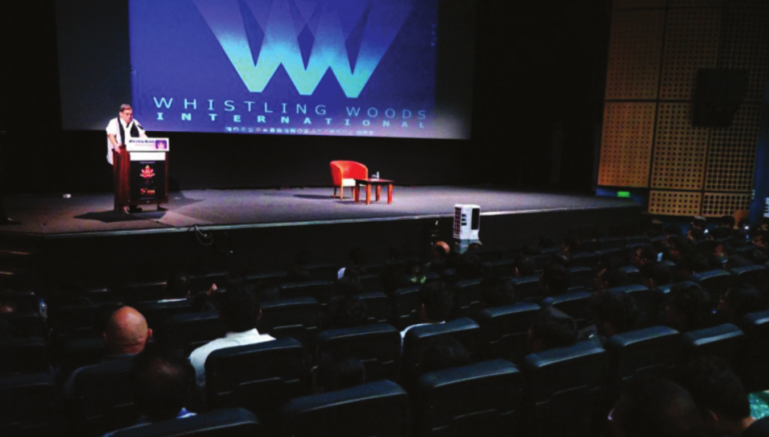Interview with Subhash Ghai & Meghna Ghai
India & You
May-June 2016

Subhash Ghai, Founder & Chairman; Meghna Ghai Puri, President, Whistling Woods International
Setting New Precedents
The 10-year-old film and media school, Whistling Woods, has come a long way through its international approach, innovative study methods and foreign tie-ups for practical trainings. However to answer the dearth of training and skills in the entertainment industry, the institute plans to start small centres in towns and cities across India, say the founder and president.
To begin with, tell us something about your institute. What was the idea behind starting Whistling Woods?
Asia’s largest school for film and media studies, Whistling Woods International (WWI) is India’s first institute started by the industry and for the industry. It is a platform for self- expression and self-realisation for those who believe in following their dreams. The idea behind starting the institute was to offer the media and entertainment industry with skilled technicians and artists and help them discover their talents, hone their skills, and contribute in bringing the Indian media industry to global platforms.
What courses and facilities does the institute offer?
WWI has gained international acclaim for its teaching methodologies and top-notch faculty from the industry. With weekly edu-connect initiatives like Masterclasses, 5th Veda cultural hub, and annual properties like Celebrate Cinema and Inspiration, WWI has been a pioneer in innovative methods of learning.

WWI’s founder, Subhash Ghai, with students at the campus
At Whistling Woods, there are full-time degree and diploma programmes accredited by the Tata Institute of Social Sciences (TISS) in filmmaking, acting, screenwriting, fashion designing, animation, music and media & communication.
What have been the achievements of the institute and what are the areas you plan to venture into?
We are a 10-year-old young school and yet in these 10 years, we have achieved a lot. Thanks to the wonderful team we have of professionals and advisors who have helped us get to where we are. Along with filmmaking, the other schools we have launched over the period of time are: Actor’s Studio, Media and Communication, Animation, Fashion and Design, Music, Vocational Education, Virtual Academy and Short Course Unit.
We are launching our first programme in branding and entrepreneurship and ad filmmaking through our association with Prahlad Kakkar, ad film director, this July.
As an institute, we have always focussed on quality over quantity and volume. We plan to become Asia’s most sought after and premier Art & Media Institute in the future, covering all aspects of creative studies under one umbrella of WWI.
With more institutes coming up in different parts of the country, how do you ensure that WWI’s students are better than the rest?
At WWI, instead of focussing on being better than others, our focus remains on enhancing our offerings and teaching methodologies as per the expectations and requirements of this extremely dynamic industry.
Our students are mentored by industry professionals through regular interactive sessions. As a globally recognised institute, we ensure that our curriculum combines both theoretical and practical learnings, and that our students are mentored by the experts of media and entertainment industry. The courses offered at WWI prepare the students to take on career opportunities in every sector in the media and entertainment industry.
How do you look at the entry of foreign institutes in India? Do you think it is a threat to private institutions here?
WWI was started with the intention of introducing education of global standards in India within the film and media sphere. In the last decade, we have succeeded in doing that and much more. The entry of foreign universities in India will definitely raise the overall standard of education system in India, which we are extremely pleased with. It will encourage private institutes to push the envelope when it comes to constant update of curriculum and teaching methodologies.
Are you into any tie-ups with foreign institutions? How it is helping the students to nourish their career?
WWI has been recognised as “a great place to study” and awarded with the same title at the House of Commons in London. We work with several foreign institutions and not just one to ensure our students get opportunities to work anywhere in the world. The institute has alliances with several renowned institutions outside of India, including Griffith University, University of Melbourne, TAFE Sydney, Deakin University in Australia; Teesside University in the UK; University of Calgary in Canada; Syracuse University, DePaul University, Chapman University, Montana State University; and the SUNY system via SUNY Oswego in the US. Besides, WWI has collaborated with Hong Kong and China based universities for co-productions. Our most recent collaboration is with the world renowned Chapman University in Los Angeles for a co-production amongst the students. This helps the students to get international exposure and the programme provides students with cross cultural exposure and global perspective. WWI has also had the opportunity to consult Trend Corp Africa to set up their first International Film school in Nigeria.
WWI became the youngest member of CILECT (a global association of film schools based out of France) and CAPA (The CILECT Asia Pacific Association), which has ensured more meaningful and long-lasting relationships with international institutes and universities.
What are your future plans for the institute?
At WWI, our vision is to create leaders and professionals by imparting world- class education and practical training from industry experts. Our aim is to associate with various organisations to ensure that our students get hands-on experience. In association with TISS, we are planning to have several centres of WWI across the country to impart vocational training in small towns and cities in the field of media and creative arts. We also plan to keep pushing the envelope by introducing new courses in design, digital marketing, entrepreneurship, branding and advertising.
In general, what are your thoughts on the state of film education in India?
India’s entertainment industry needs more training and up-skilling. People are realising the importance of film education gradually, but it still needs to be more prevalent and almost a pre-requisite for anyone entering the industry to ensure that they add to the quality of Indian cinema.
As the media and entertainment industry is growing, the need for skilled artists and technicians is also growing. They are looking more for people with education in this space and the formation of the National Skills Development Council (NSDC) in India across sectors and including entertainment in those sectors is a step to formulate the necessary training skills needed for certain positions in the industry. Once that is ratified, we can finally put the idea forward that talent alone is the driver of the media and entertainment industry.









